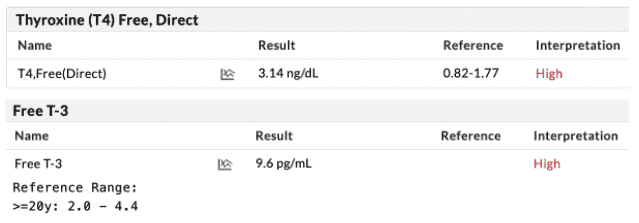Hyperthyroidism is a thyroid condition in which your thyroid is overactive. This indicates that your thyroid is overproducing too much thyroid hormone, known as thyroxine.

Hyperthyroidism is a thyroid condition in which your thyroid is overactive. This indicates that your thyroid is overproducing too much thyroid hormone, known as thyroxine.
In hyperthyroidism, your metabolism is put on overdrive, which is why many patients often experience some common symptoms like diarrhea, unintentional weight loss, and an increase in appetite.
Symptoms that may be associated with an overactive thyroid include unintentional weight loss, anxiety, diarrhea or loose bowel movements, increased appetite, nervousness, hair loss, irregular periods, irritability, sensitivity to heat, increased sweating, palpitations, rapid heartbeat, and insomnia.
While some individuals with hyperthyroidism may experience severe symptoms, others may experience little to no symptoms.
It is important to see a practitioner who will take a full medical history and assess your symptoms and complete a thorough physical examination.
Your practitioner will order lab tests to assess your thyroid function. These tests usually include a comprehensive thyroid panel including TSH and your free thyroid hormones T4 and T3.
Your Physician may also think it is warranted to assess for an autoimmune cause of your thyroid condition and will run other markers including anti-thyroid peroxidase, thyroglobulin stimulating immunoglobulin, and thyroglobulin antibody.
Along with a thyroid panel, your physician may assess other important markers including iodine, iodine/creatinine ratio, and order thyroid imaging to get a full picture of your thyroid function.
Your physician may also order a lipid panel to assess your cholesterol and triglyceride levels are hyperthyroidism may be linked to low cholesterol and triglyceride levels.


There are several factors that could cause hyperthyroidism. The most common cause of hyperthyroidism is Graves Disease, an autoimmune attack on the thyroid. Other potential causes of hyperthyroidism may include:
Hyperthyroidism is more common in females than males, affecting 2 out of every 100 females and 2 out of 1,000 males. Hyperthyroidism is also more common in:
The treatments for hyperthyroidism vary depending on your symptoms and your lab and imaging results.
Oftentimes, anti-thyroid medications are prescribed which will prevent your thyroid from making an excessive amount of hormones. Some of the treatments for hyperthyroidism may include:
Because your thyroid plays a major role in your metabolism, if it's not regulated or stable, it can wreak havoc on many of your other body systems. Some complications may include:
Yes. If you're on too much anti-thyroid medication or have had part of your thyroid removed, its likely that you will become hypothyroid.
Hypothyroid symptoms may include weight gain, hair loss, constipation, fatigue, joint pain, cold intolerance. Frequent follow-ups and lab testing with your Physician can help you keep your thyroid better managed.
A 57 yo male presented to a clinic with a diagnosis of Graves’ Disease. His prior Physician recommended radioactive iodine, however, the patient wanted a second opinion. He was having significant symptoms including heart palpitations, significant weight loss, extreme hunger, increased heart rate and visual changes. He was undergoing a lot of stress from work and had previous infections. Through shared decision making, we decided to start the patient on methimazole (anti-thyroid medication), a beta blocker, immune support (specifically for autoimmune thyroiditis) and followed up three weeks later. The patient was also referred for a cardiac and ophthalmologic work-up.
I called the patient the next day to see how he was feeling on the medicine, and he said he already felt better and his heart rate was lowering. At his follow-up appointment three weeks later, the patient stated he was feeling significantly better and was no longer getting the adrenaline rush with obeshe was feeling a few weeks prior. The patient was responding well to the medicine and he was instructed to continue at the same dose. The Patient's nutrient status was also checked and he was put on several vitamins and liver support.
The patient came in several weeks later and said overall he was feeling 7.5/10 (10 being the best) and previously was feeling a 3/10. The patient's labs were run and he was responding very well to the medicine and we were able to reduce his thyroid medicine.
The patient is scheduled for a follow-up this month and will repeat thyroid labs and imaging so we can visualize the thyroid gland.

Acupuncture Session - $189.00
Acupuncture, Package of 4 - $636.00
Female Pellet Insertion Package - $518.00
Male Pellet Insertion Package - $744.00